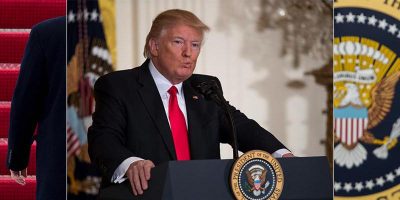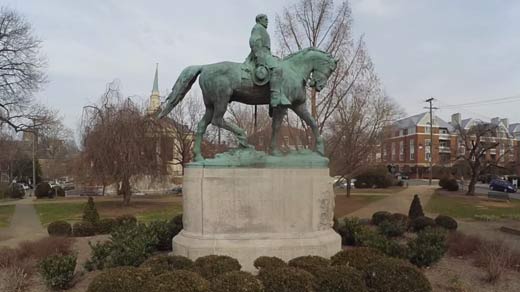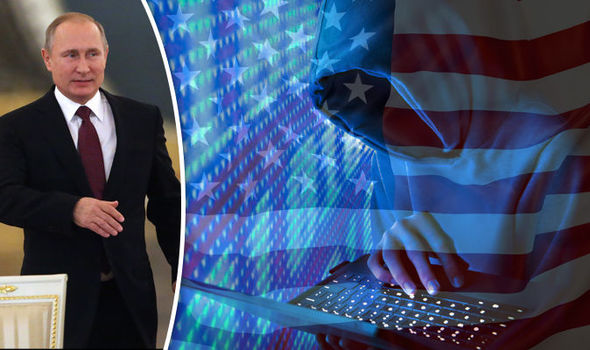Never Mind the Real Russia, This Is All About Trump
An interview with David Swanson

In American politics, Donald Trump has been so effectively identified with Russia that hostility or friendship toward Russia is now driven by feelings about Trump. David Swanson, founder of World Beyond War and author of “War is a Lie” and “War Is Never Just,” was on a friendship tour in Russia when a Tiki torch-bearing crowd protested the removal of a Confederate monument in his hometown and chanted “Russia is our friend.” I spoke to David Swanson upon his return.
Ann Garrison: On May 13, in your hometown—Charlottesville, Virginia—a Tiki torch-bearing crowd protested the removal of a statue of Confederate General Robert E. Lee. The protesters chanted “Blood and Soil,” a well-known Nazi slogan invoking the bloodline of a people and its territory, and “Russia is our friend.” You were in Russia at that time on a friendship tour, so could you tell us how Russians perceived this?
David Swanson: At that time, few of them had heard about it, and I hope that remains the case. I did discuss it with some, and I mentioned it immediately to a Russian friend I was with. He objected, “But we didn’t have slavery; we had serfdom. It’s not the same.” He just didn’t understand connecting Russia to slavery, much less to Nazism, given that Russia is the country that defeated Nazism.

Statue of Confederate Gen. Robert E. Lee in Charlottesville (Source: NBC)
Russians have absolutely no idea that hatred of Russia can be driven by hatred of Trump. They have no idea whatsoever that Trump is doing anything unpopular on the domestic front. They don’t know that he’s going after environmental protections, or poverty relief, or women’s rights, or that he’s going after immigrants. They do know about longstanding, deeply entrenched, decades-long hatred of Russia in Washington, D.C. They think that hatred of Russia drives hatred of Trump. Of course, the reality is both ways, but they only know about the one. So you have to explain to them who Trump is, why somebody who wants to be friends with Russia, like myself, does not like Trump. There’s a lot of explaining to do.
AG: Didn’t you lead the effort to have the Robert E. Lee statue taken down there in Charlottesville?
DS: No, I certainly don’t think anyone would give me credit for that. In fact, the push to get rid of these Confederate statues in Charlottesville came from directions similar to the Black Lives Matter movement and was driven, I think, purely by opposition to racism. Most of the advocates for taking down the Confederate general statues in Charlottesville probably having nothing whatsoever against war any more than any other good war-loving Americans. Their problem is with racism, with bad wars, with a war for slavery and defending the slavery side of that war. That’s why they wanted these statues gone.

David Swanson (Source: ODiario.info)
I jumped in and said, “Yes, you’re absolutely right. Get rid of these statues. There are some other reasons, too, to get rid of these statues. They’re war statues. The only statues we have here in Charlottesville are war statues. There are no peace statues. There are no anything else statues. There are no civil rights statues, no women’s rights statues, no labor movement statues. There’s nothing memorializing 99.99% of the history of this town. Only these two Confederate generals who, so far as I know, never even visited this town are memorialized by monumental statues.”
Ironically, the issue of memorializing war, which nobody in the United States ever wants to face, was forced into the conversation because there’s a law in Virginia that says, “Thou shalt never tear down a war statue.” Even if you’re doing it purely because it’s a racist statue. Now it’s in the courts. Even though the city has said, “Take down the statue,” there’s a court case arguing that it can’t be taken down because we’re not allowed to take down any war statues.
There is no law that says you can’t take down any peace statues or any peace memorials. For that matter, there aren’t any peace memorials to consider taking down. Yet that’s hardly scratched the surface of the ongoing conversation, which remains purely about racism and that’s of course been inflamed further by the racists at this torch-lit rally chanting Nazi slogans and “Russia is our friend.” I’m very glad that at least a few people were confused by this “Russia is our friend” slogan.
AG: I know that you always favor dialogue over confrontation, and you’ve said that despite everything, you feel some empathy for these people and understand their concerns. Could you explain that?
DS: Well, we should feel empathy for everyone. I’ve had people attack me in this debate for trying to humanize the racists. If you can’t humanize humans, who can you humanize? Some of them are cynical politicians, including a candidate for governor of Virginia who comes from Minnesota, a pro-Trump guy who wants to become a Confederate by leading the charge to defend the Confederate monuments. By the way, these monuments are coming down in New Orleans just ahead of Charlottesville, and there’s discussion of taking them down in Richmond.
Aside from the cynical politicians, a lot of these people share the obvious, legitimate grievance of living in a country that’s rolling in money and does not provide decent education, opportunity, retirement security, or health care, and leaves them on edge and ill at ease about their lives all the time.
And it must be noted that we’re a culture that’s progressed so far in certain ways that it’s just inexcusable to make sexist or racist comments about women and most minorities, but you can make jokes about white rednecks anytime you like. You can have comedy specials about rednecks. You can push any sort of stereotypes or generalizations about white people, and especially poor white people, and that’s totally acceptable. That fuels this sort of resentment among people who haven’t been taught anything about history, but know that some African-American kid got a scholarship to a school that they didn’t get.
We haven’t found the wisdom and the political force to do things right, to do things the way Scandinavia does—to provide rights for everyone, a basic income for everyone, health care for everyone, job security, retirement, paid vacation, a clean environment, transportation, and child care for everyone. We have a system that funnels resentment into our politics by creating giant bureaucracies to weed out the deserving poor from the undeserving poor and make sure the little scraps get tossed to the right people and not the wrong people. So that’s a lot of where this movement comes from.
These people will tell you they’re not racist. They’ll tell you they don’t want slavery. They’ll tell you they’re out there to defend the white something, and sometimes they’ll say the white race. Sometimes they’ll say the white ethnicity. They identify with the white something as their group. They ask, if it’s acceptable to identify with and celebrate being a Latino, an African American, or an African American homosexual, or this, that, or the other thing, then why isn’t it acceptable to celebrate being white? This is their cause. I don’t think it’s a kind or generous or productive cause. I don’t think it’s helpful and I wouldn’t defend it, but to suggest that they’re not human, that they’re monsters, that they just behave irrationally without any explanation is to treat them the way U.S. government propaganda treats Russia, Iran and North Korea, and that’s not helpful.
AG: When I volunteered at the Common Ground Collective in New Orleans after the flood, they let us know that the racist aspersion “cracker” was not acceptable there.
DS: I don’t think it should be acceptable anywhere. I don’t think any racial insults should be acceptable anywhere.
AG: How do you think the people at this torch lit protest understood the chant, “Russia is our friend”?
DS: I don’t know any more than you do really. I haven’t spoken with them or communicated with them about it. The other response to that protest that I heard first in Russia, then back here at home, was, “Oh, it’s the work of the deep state. The CIA has planted that.” No, I don’t think so. This is the work of a handful of racists feeding off of what has been deeply implanted in U.S. culture over the past six to eight months. That is, the idea that Trump is on one side and the people attacking Trump are on the other side, and Russia is on the Trump side. It doesn’t matter if six months ago, you would have cared nothing about Russia or been hostile toward Russia. The defenders of Trump accept without any evidence, just as the opponents of Trump accept without any evidence, that Russia had something to do with electing Trump.
We haven’t seen a shred of proof. I’m absolutely certain that if there were any proof we would have seen it by now. The whole thing’s become a bait and switch where, instead of any evidence coming forth, we start hearing about other abuses whether it’s obstruction of a federal investigation—whether that investigation was going anywhere or not—or financial ties to Russian criminals on the part of Trump’s subordinates, or whatever. Even so, this idea that Russia somehow determined the outcome of our presidential election has been so firmly implanted in U.S. culture that both sides just accept it. The side that’s out there to cheer for Trump, they want to thank Russia and be friends with Russia. If the right wing populists in this country had, for whatever reasons, chosen to demonize Russia, these same people would be out there demonizing Russia. If the Democratic Party had made a grand cause of friendship with Russia and disarmament and ending nuclear weapons madness, then liberal supporters of the Democratic Party would be out there saying, “Let’s be friends with Russia.”
It’s pure partisanship, and yet it’s very dangerous because it’s stirring up hostility between two nuclear-armed governments. Much of the deep state in Washington, D.C. benefits from and openly wants hostility with Russia to increase weapons sales and bureaucratic power, and this is playing with fire. It’s playing with apocalypse. It might be funny if it weren’t for that.
AG: In this piece you recently wrote, “Leave Russia the Блядь Out of U.S. Scandals,” you address the recent uproar about Donald Trump sharing classified info about ISIS with Russian officials. Could you tell us what you had to say about that?
DS: Well, I don’t know any more about what was shared than you do. We were told it was information helpful in going after ISIS that came from Israel’s so-called intelligence so-called services and that this might therefore endanger our relationship with these so-called intelligence services.
Trump has always maintained that he wants to work with Russia on combating terrorism. Russia has always maintained the same public approach to working with the United States, and, as far as we know, the same private approach. They want us to work together.
Now they want to work together on something that I see as counterproductive, immoral and illegal on its own terms. That is, using warfare to stamp out terrorism, using a larger tactic of terrorism to stamp out terrorism, which of course just fuels a cycle of violence and produces more terrorism, but this is what they both want to do. This is what just about everybody agrees the United States should be doing. They’re just outraged that Trump would do it in collaboration with Russia.
You can go back and look at when past U.S. presidents and past presidents and premiers of Russia and the Soviet Union have shared all kinds of secrets with each other. Bush the First told Gorbachev that there was a coup coming and who the source of the information was. FDR and Stalin shared all kinds of information. And by the way, some Russians complained to me that Stalin was never demonized in the U.S. media the way Vladimir Putin has been. And Stalin killed millions of people.
 The bait and switch that I mentioned earlier, beginning with the story that Russia decided the U.S. presidential election, then switching to all these other crimes that have some sort of connection to Russia—any connection to Russia—is creating this atmosphere where not just the Russian government but the Russian people are identified as enemies of the United States. A people is not a government, and a government that has flaws does not typically see those flaws improve in response to threats, sanctions, attacks, or lies about it.
The bait and switch that I mentioned earlier, beginning with the story that Russia decided the U.S. presidential election, then switching to all these other crimes that have some sort of connection to Russia—any connection to Russia—is creating this atmosphere where not just the Russian government but the Russian people are identified as enemies of the United States. A people is not a government, and a government that has flaws does not typically see those flaws improve in response to threats, sanctions, attacks, or lies about it.
I met with opponents of Putin in Russia who said, “The sanctions have cut Russian incomes by about ten percent even though they’ve benefited Russian agriculture. As long as these sanctions are in place, I’m not going to oppose Putin. I’m going to align with Putin and unite behind Putin, and if the sanctions ever end, well, then I’m going to go back to criticizing Putin.” This is the predictable and consistent result of going after a country. The country unifies against the external aggressor. The approach the United States has been taking since Obama put these sanctions in place and created this new Cold War is not working, and it’s never going to work.
AG: Anything else you’d like to say?
DS: Go to Russia, if you’re going to take a vacation. Russia has the largest, most beautiful cities in Europe. Russian people speak English and love Americans. The signs are in Russian and English. You get lots of rubles for your dollar. The sun comes up in the middle of the night now and stays up nearly twenty-four hours, and it’s beautiful weather. More Americans need to meet more Russians and invite Russians to come back and meet them.
David Swanson is the founder of World Beyond War, and the author of “War is a Lie” and “War Is Never Just.” He can be reached at davidswanson.org or worldbeyondwar.org.
Ann Garrison is an independent journalist based in Oakland California. In 2014, she received the Victoire Ingabire Umuhoza Democracy and Peace Prize for her reporting on conflict in the African Great Lakes region. She can be reached [email protected].

